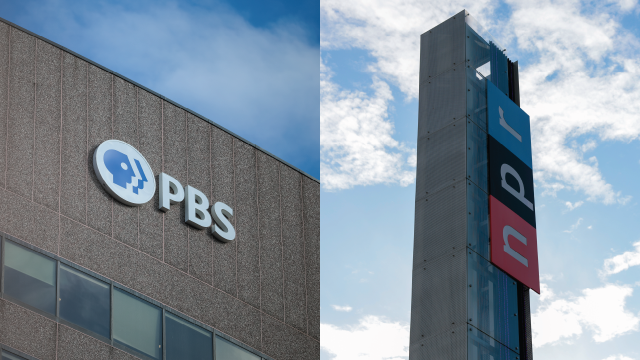
The chief executives of NPR and PBS faced questions in a March 26 congressional hearing as Congress considers legislation that would prohibit federal funding for the public broadcasters.
About a quarter of U.S. adults (24%) say Congress should remove federal funding from NPR and PBS, according to a Pew Research Center survey conducted March 10-16. A larger share (43%) say NPR and PBS should continue to receive funding from the federal government, while 33% say they are not sure.
The funding structures for NPR and PBS are complicated, and much of their revenue comes from nongovernment sources like member donations and corporate sponsorships. But the proposed bill would ban all federal funding for the Corporation for Public Broadcasting (CPB), which has received $535 million annually in recent federal budgets. The CPB helps to fund NPR and PBS both directly and through individual local public media stations, many of which pay NPR and PBS in the form of membership or programming fees.
Republicans are much more likely than Democrats to support ending federal funding for public media. Among Republicans and GOP-leaning independents, 44% say Congress should end funding for NPR and PBS, while 19% say funding should continue and 37% say they are not sure. Republicans ages 50 and older are especially likely to support ending federal funding for public broadcasters.
By contrast, just 5% of Democrats and Democratic leaners say federal funding for NPR and PBS should be cut off, while 69% say funding should continue and 26% are not sure.
There also are large partisan differences in how many people get news from NPR and PBS – and whether they trust these outlets as sources of news.
Overall, 20% of U.S. adults say they regularly get news from NPR, and 21% say the same about PBS. In both cases, Democrats are much more likely than Republicans to say this:
- 32% of Democrats say they regularly get news from NPR, vs. 9% of Republicans.
- 31% of Democrats regularly get news from PBS, vs. 11% of Republicans.
These questions were asked as part of a forthcoming study of Americans’ views toward dozens of media brands across different platforms (e.g., television, print, radio and digital). These include a wide variety of news sources with audiences across the ideological spectrum.
Democrats are also more likely than Republicans to trust NPR and PBS as sources of news:
- 47% of Democrats and 12% of Republicans say they trust NPR as a source of news. By contrast, 26% of Republicans and 3% of Democrats say they distrust NPR.
- 59% of Democrats and 23% of Republicans say they trust PBS as a source of news. By contrast, 26% of Republicans and 4% of Democrats say they distrust PBS.
Note: Here are the questions used for this analysis, the topline and the survey methodology.

